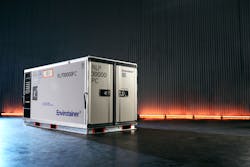Founded more than 35 years ago, Envirotainer offers a large fleet of containers globally, standing at about 6,000, says Niklas Adamsson, chief operating officer, Envirotainer.
“Envirotainer researches, develops, manufactures, leases and manages temperature-controlled air cargo containers. These have been a mainstay since the company’s inception. We also provide innovative tools and services for validation, planning, shipping and monitoring of them,” Adamsson says.
The containers are large, battery-powered and insulated units that can have up to five pallets of pharmaceuticals loaded into them, depending on the model and size. Fully charged, these units can maintain a constant internal temperature for up to a week.
They are purpose built to be loaded as air freight unit load devices (ULDs) and travel around the world in a circular economy like high-tech shipping containers designed specifically for air transport.
“The product range includes the Releye family of advanced containers, launched in 2021, which are designed to meet the strictest requirements in pharmaceutical air freight. They were created with control, monitoring, autonomy, value and sustainability in mind,” says Adamsson.
“These are complemented by the CryoSure series, also launched in 2021, which offer a revolution in -70 degree C cold chain transportation. Whereas the majority of temperature-controlled pharmaceutical shipments have historically involved temperature ranges of 2–8 degrees C and - 15 to -25 degrees C, many pharma products such as cell and gene therapy, mRNA vaccines and biospecimen samples require below -70 degrees C shipments. CryoSure meets that need,” Adamsson adds.
He continues that the Releye RAP is currently the biggest and most advanced container in its field, and offers 170 hours of autonomy to maintain temperature and protect cargo.
“In most cases, it will be regularly recharged and keep protecting the cargo indefinitely. The integrated live monitoring enables a unique insight into product condition, location and progress of the shipment. Its large size ensures costs and environmental impact can be reduced by maximizing the amount of pharmaceuticals that can be held within,” Adamsson says.
Customers have been needing and demanding bigger and better solutions that are cost-effective and sustainable, according to Adamsson. In such a highly regulated market, he says they’re looking for control to keep shipments safe; monitoring, to ensure there are no temperature deviations, tampering and to assist with any investigations; and they also need autonomy, to allow for delays and challenges with an air freight system under pressure.
He adds that the market is being driven by two factors. On one hand, the biopharma market is growing, with more medicines that need cold chain transport in an effective and sustainable way. That calls for large, thermally controlled containers.
The other market factor is the growth in personalized medicines and cell and gene therapies. This calls for -70 degree C transportation.
About the Author
Walker Jaroch
Editor
Contact: Walker Jaroch
Editor | AMT
+1-920-568-8399
>> To download the AviationPros media kits, visit: Marketing Resource Center
>>Check out our aviation magazines: Ground Support Worldwide | Airport Business | Aircraft Maintenance Technology

